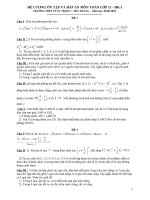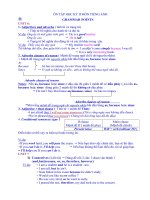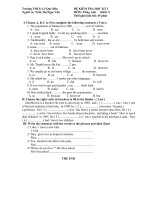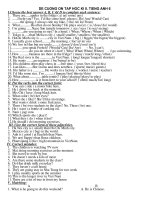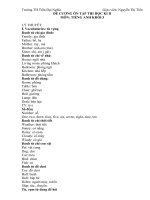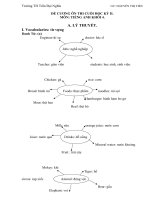Giao an on tap hoc ki I Tieng Anh 9 Tiet 34
Bạn đang xem bản rút gọn của tài liệu. Xem và tải ngay bản đầy đủ của tài liệu tại đây (150.52 KB, 6 trang )
<span class='text_page_counter'>(1)</span>Planning date:. Teaching date:. Period 34: REVISION FOR THE FIRST SEMESTER 1. Aims: By the end of the lesson, students will be able to: a. Knowledge - Review and remember some important grammar/ structures that they have studied in the first semester: + The modal verbs with “If” + The reported speech and the tag questions. + The passive. - Apply the grammar on doing the exercises. b. Skills Drill all the skills c. Behavior Like learning English. 2. Preparation: a. Teacher: Textbook; Teaching plan; grammar book; workbook. b. Students: Textbook; notebook; school things; prepare well for the new lesson. 3. Procedure *Organization T: greet and check the attendance. Sts: reply. 9A:. 9B:. 9C:. 9D:. a. Check the old lesson (5’) T: check Ss’ preparations. Ss: get ready. T: today we’re going to review some important grammar/ structures that you have studied in the first semester. Let’s begin the lesson. b. New lesson * Grammar (15’) 1. Modals with “If” T: ask Sts to retell the conditional sentences type 1 and the form with the modals in the main clause. Sts: do the task. T: feedback Form If clause main clause ( present simple) ( modal verbs) Ex: If you want to improve English, we can help you. Trong mệnh đề chính, thay vì sử dụng will, ta có thể sử dụng - may/can để chỉ sự cho phép. Ex: If you eat all your dinner, you can have a chocolate. - may/might/could để chỉ khả năng có thể xảy ra..
<span class='text_page_counter'>(2)</span> Ex: If he doesn’t come soon, he might miss the train. - Can/could để chỉ khả năng. Ex: If the ice is thick, we can walk across. - must/ have to để chỉ sự bắt buộc. Ex: You must do your homework if you want to go out. - should/ ought to để chỉ lời khuyên hoặc gợi ý. Ex: If you want to get well, you ought to stay in bed. Sts: copy and remember the models. T: ask Sts to retell the grammar of the reported speech. Sts: do the task. T: give feedback. - When report others’ speech, we must follow some rules: + The rule “one tense back” + Some changes (Ex 2 - page 38 - TB) 2. The reported speech T: Ask Ss some questions about the grammar. Ss: Answer. T: Listen and repeat the grammar. Có hai cách để tường thuật điều ai đó nói: lối nói trực tiếp và lối nói gián tiếp. + Direct speech Khi chúng ta sử dụng lời nói lối nói trực tiếp, chúng ta nhắc lại nguyên văn của người nói. Ex: Marry: I’ve bought the tickets. She said, “I’ve bought the tickets.” + Reported speech Khi chúng ta sử dụng lời nói lối nói gián tiếp, chúng ta chú ý nghĩa chính xác của của lời nói mà không nhất thiết phải sử dụng nguyên văn lời đã nói. Ex: Marry: I’ve bought the tickets. She said (that) she had bought the tickets. Về thì Nếu động từ tường thuật của câu ở thì quá khứ thì phải lùi động từ chính về quá khứ một bậc .Ta chuyển đổi theo bảng sau : Thì 1.Hiện tại. Thì của câu trực tiếp S + am/is/are. Thì của câu gián tiếp S + was / were. đơn. - “He is a student”Lan said S + V0/ s / es. -Lan said he was a student S + V-ed/ V2. - “Nam goes to school today”Ba. -Ba said Nam went to school that day. said 2. Hiện tại tiếp diễn 3.Quá khứ đơn. S + am /is / are + V-ing. S + was / were + V-ing. -“ I am singing an English song” Ba Said.. -Ba said he was singing an english song .. S + V-ed/V2. S + had + V-ed/ V3. “ She played chess with me last. -He said she had played chess with him the night before. night” he said.
<span class='text_page_counter'>(3)</span> 4.Quá khứ tiếp diễn 5. Tương lai. 6.Hiện tại hoàn thành 7 . với đt. S + was / were + V-ing. S + had been + V-ing. -“ He was doing his HW, when I -Hoa said he had been doing his HW came” Hoa said S + will + V0. (when she had came) S + would + V0. -“ They will be 15 on Monday” his. His mother said they would be 15 on monday. mother told S+ have/has + V-ed/ VIII. S + had + V-ed /VIII. -“you have finished all your HW,Na” the teacher said. -The teacher said Na had finished all her HW. S + can + V0. S + could + V0. “Can” - “ You can learn well ,Nam” The teacher said - The teacher said Nam could learn well Một số chuyển đổi khác khi chuyển từ lời nói trực tiếp sang gián tiếp mà động từ tường thuật ở thì quá khứ thì các trạng từ chỉ thời gian, nơi chốn và đại từ chỉ định được chuyển theo quy tắc sau : Trong câu trực tiếp To day Tonight Yesterday Tomorrow Next week Last week. Trong câu gián tiếp That day That night The day before / the previous day The day after/ the following day The week after / The following week The week before / the previous week. Last night The night before This That These Those Here There Now Then Ago Before Một số dạng thường gặp * Câu tường thuật loại câu hỏi Có hay Không (Yes – No questions)có dạng : Loại câu này được mở đầu bằng các động từ: ask, inquire, wonder... và theo sau có If hoặc whether. Ex: “Did you go to school yesterday?” Hoa asked. → Hoa asked me if/ whether I had gone to school the day before. * “ Is she beautiful,Nga?” Hung asked. → Hung aksed Nga if / whether she was beautiful. * “Are you hungry, John?”She asked. → She asked John if/ whether he was hungry..
<span class='text_page_counter'>(4)</span> * Câu tường thuật loại câu có từ để hỏi (Wh – question ) có dạng: Example: - “ Where are you going” She said to me . → She asked me where I was going -“ What’s her name ?” Chung asked me. → Chung asked me what her name was. Sts: write the grammar in the notebook. T: give Sts the copies of the exercises, ask them to do the exercises individually then compare the answers in pairs. Give feedback and correct mistakes if necessary. Sts: do the task. 3. The passive voice T: Ask Ss some questions about how to use the passive voice. Ss: Answer. T: Listen and write the correct answers. Thể bị động (the passive voice) là một dạng thức của động từ rất phổ biến trong tiếng Anh. Một động từ được dùng ở thể bị động khi chủ ngữ của nó không phải là tác nhân gây nên hành động mà là đối tượng nhận, chịu hay bị tác động của hành động thể hiện bởi động từ đó. Quy tắc chuyển đổi S V O. S. Be +P.P. by Agent(tác nhân gây hành. động) - Lấy tân ngữ của câu chủ động làm chủ ngữ của câu bị động. - Nếu có trợ động từ trong câu chủ động, bạn hãy đặt những trợ động từ ấy liền ngay sau chủ ngữ mới. - Thêm động từ be vào sau trợ động từ hay các trợ động từ cùng một hình thức vời động từ chính trong câu chủ động. - Đặt động từ chính trong câu tác động sao cho trợ động từ và động từ be ở hình thức quá khứ phân từ. - Đặt chủ ngữ của câu chủ động sau động từ trong câu bị động với từ by đi trước (cũng có thể bỏ hẳn nếu nó không quan trọng hoặc được hiểu ngầm). Dạng thức thể bị động. - Thể bị động có dạng thức là: BE + V-ed/3 + (by – agent) (V-ed/3 tức là dạng quá khứ phân từ) + Present simple tense S+ is/ am/ are + past participle Ex: Marry writes a letter. → A letter is written by Marry. + Past simple tense.
<span class='text_page_counter'>(5)</span> S+ was/ were + past participle Note: I/ He/ She/ It + was You/ We/ They + were Ex: Marry wrote a letter. → A letter was written by Marry. + Present perfect tense S+ have/ has + been + past participle Note: I/ We/ You/ They + have He/ She/ It + has Ex: Marry has written a letter. → A letter has been written by Marry. + Simple future tense S+ will/shall + be + past participle Ex: Marry will write a letter. → A letter will be written by Marry. + Future of intention S+ is/ am/ are + going to + be+ past participle Ex: Marry is going to write a letter. → A letter is going to be written by Marry. + Modal verbs can, may, must, ought to, should, would, could, might... S+ modal verb + be + past participle Ex: He should type his term paper. → His term paper should be typed. * Exercises (20’) Ex1: Change these sentences into reported speech 1. Ha: “I can’t find my book.” 2. They: “We are learning English now” 3. She: “I will have an exam tomorrow.” 4. The examiner asked Lan: “Where do you come from?” 5. He asked me: “Do you like watching sports?” Ex2: Put the verbs in brackets in the first condition 1. If you (read) in bad light you (ruin) your eyes. 2. If you (see) him, (tell) him to ring me up. 3. If you (not change) your wet clothes, you (have) a cold. 4. I (take) my umbrella if it (rain) this afternoon. 5. What I (do) if the train (be) late? 6. I (return) next week if you (want) me to. 7. I (be) sorry if they (not come). 8. I can’t do anything if I (not feel) very comfortable. Ex3: Put the following into the passive voice. 1. My friend booked the flight. 2. They make cars in the USA. 3. People are drinking a lot of coffee nowadays. 4. Scientists have made new scientific discoveries. 5. People export rice from Thailand..
<span class='text_page_counter'>(6)</span> 6. They are repairing my bike today. 7. My company didn’t build that road. 8. My cousin, Tom, will meet you at the airport. Ss: Write the completed exercises in the notebook.. Answers:. Ex 1: Change these sentences into reported speech 1. Ha said she couldn’t find her book. 2. They said they were learning English then. 3. She said she would have an exam the following day. 4. The examiner asked Lan where she came from. 5. He asked me if/ whether I liked watching sports. Ex2: Put the verbs in brackets in the first condition 1. read- will ruin 2. see-tell 3. don’t change – will have 4. will take-rains 5. will I do/should I do- is 6. will return-want 7. will be sorry – don’t come 8. don’t feel 9. want-will ask 10. come – will not let Ex3: Put the following into the passive voice. 1. The flight was booked by my friend. 2. Cars are made in the USA. 3. A lot of coffee is being drunk nowadays. 4. New scientific discoveries have been made.. 5. Rice is exported from Thailand. 6. My bike is being repaired today. 7. That road wasn’t built by my company. 8. You will be met by my cousin, Tom, at the airport. c. Summary (3’) T: summarize all the taught languages. - The important grammar that they have learned in the first semester. Sts: remember. d. Homework (2’). T: assign homework:. - Learn by heart all grammar. - Do exercises again and write in the notebook. - Prepare well for + Adverb clauses of result + Gerunds after some verbs ___________________________________________.
<span class='text_page_counter'>(7)</span>




